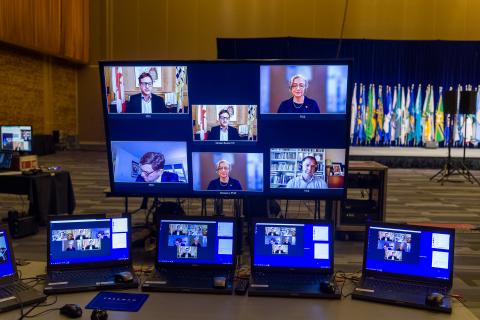A provincial approach to support regional growth planning is focused on expanding affordable housing and green transportation while renewing and expanding health care buildings and educational facilities. A panel of Ministers described the essential role of local government in order to achieve these aims during a Cabinet townhall at the UBCM Convention today.
Minister Whiteside referenced the work the province is undertaking with local governments on the siting of new and upgraded educational facilities. The Education Minister also shared details on the provincial initiative to further integrate child care services within the education system.
Attorney General and Minister Responsible for Housing David Eby acknowledged that the market is not going to solve all of BC’s housing problems. He enumerated several critical initiatives to address much needed housing supports: social housing, indigenous housing, supportive housing, and women’s transition housing. Eby highlighted an unprecedented provincial program to build housing of First Nations reserves, which was historically a federal responsibility.
Eby also affirmed the positive discussions underway with communities in Metro Vancouver with regard to transit-oriented funding to build high density housing along transit routes to ensure that the proper zoning for such development is in place.
The Attorney General encouraged local governments to explore the resources provided through the Housing Hub for the creation of purpose built rental and more affordable home ownership options. Eby also referenced the importance of recent policy work on the Development Approval Process which have illuminated potential changes to the current process that will accelerate the delivery of new housing.
Health Minister Adrian Dix observed that, “health care has never been so singularly important in our lives.” The health crises we have faced, COVID-19, the overdose crisis, the heat dome and effects of climate change, have shone a spotlight on our capacity to care for British Columbians, and essential services to communities during the pandemic, he said.
Dix emphasized the concurrent demographic fact that new challenges are presented by BC’s aging population. “We have underestimated future demand of health care. As our population ages, so does the demand on health care workers.”
“Many of our hospitals built largely in the 50s and 60s and the replacement process has been delayed,” he said. He listed recent investments in just one health authority, with “major projects in Dawson Creek, Fort St. James, Terrace, Prince George, and Quesnel.”
During the question period, Eby shared details on provincial efforts to provide complex care housing. The Attorney General indicated that it is common for 15-20% of people who are housed for homelessness to not remain housed. The goal of complex care is to provide supports for this population, primarily through health care responses. It is anticipated that these programs will be delivered by health authorities. Eby advised local governments that have a project in mind, to reach out to their local health authority.
The Attorney General also outlined the support BC Housing is providing along with the Ministry of Municipal Affairs to help Lytton rebuild. One of the greatest challenges facing the community is the contamination of the townsite as a result of the wildfire. Eby also referenced the real challenges for the Village’s capacity due to its city hall burning to the ground. The Minister affirmed that the province would maintain a high level of involvement as a rebuilding strategy is developed.
In response to a question on the need for greater investments in B.C.’s road system, Minister Fleming indicated that the 2021 budget has record level of funding for sideroad improvements. Fleming also said that in light of climate change there is a need to revisit road construction standards and a proactive climate adaptation response. Productive discussions with the federal government were underway prior to the current election.
In a response to a question about the continuing challenge with government for effective coordination between ministries, Eby admitted that this continues to be a challenge. He referenced the creation of a cabinet sub-committee on housing that includes several Ministers and Deputy Ministers was undertaken to break down the silos in order to strengthen provincial action.

